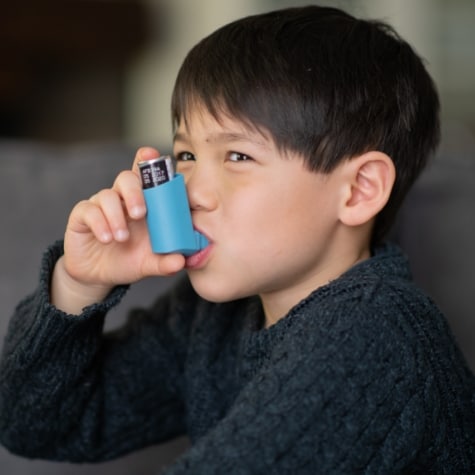Breaking Down Asthma in Kids
Updated 4/5/21
It can be scary when your child has trouble breathing. But parents who understand what asthma is, how it’s triggered and how it’s treated will be better able to care for their kids.
Asthma is a chronic lung condition that affects the airways, or the tubes that carry air in and out of the lungs. In a child with asthma, airways react to certain triggers, causing the following:
- Airway swelling
- Tightening of the muscles that are around the airways
- Extra mucus production in the airways
These three events can lead to coughing, wheezing and difficulty breathing.
When a child suddenly has trouble breathing, it can be scary and confusing for parents.
“Is it asthma, allergies or something else? When your child has trouble breathing, it can be hard to tell what’s causing it. That’s why learning the facts about asthma is so important,” says Matthew L. Hazen, MD, a Pulmonologist at Children’s Healthcare of Atlanta. “This way, parents know what to look for and when to ask for help.”

The causes of childhood asthma are multifactorial, meaning that there is no one cause. Instead, many different factors can cause a child to develop asthma. Examples of these factors are:
- Genetics: Children are more likely to have asthma if they have family members with asthma.
- Allergies: Children who have seasonal or environmental allergies are more likely to have asthma.
- Respiratory infections: Some respiratory infections in infants can increase the risk of developing asthma.
- Environmental factors: Irritants like pollution and allergens are known to increase the risk of asthma. This is especially true of secondhand smoke.
Do children outgrow asthma?
How asthma will affect children throughout their lifetimes varies.
- Many infants and toddlers may wheeze when sick with a viral illness, such as a cold or the flu. However, most of these children don’t get asthma later in life.
- Some children with persistent wheezing and asthma get better during their teenage years.
- About half of the children who have asthma at a young age appear to outgrow it, although asthma symptoms may reappear later in life.
The sooner you can recognize the symptoms of an asthma flare-up, the sooner you can seek help in managing it. Common asthma symptoms include:
- Cough with or without phlegm
- Shortness of breath that worsens with activity
- Chest pain, congestion or tightness
- Wheezing or whistling when exhaling
When asthma symptoms suddenly get worse, it’s called an asthma attack or flare-up.
Asthma flare-ups are caused when the airways in your child’s lungs are bothered by an asthma trigger. Your Asthma Action Plan will show you what symptoms to look for and the steps to take when they happen. If you don’t have one, make sure to talk with your child’s doctor.
An Asthma Action Plan is a step-by-step guide to help you treat your child’s asthma. It will tell you what medications to take each day and what to do if your child has a flare-up. It will also tell you how to contact your doctor if you have questions.
You should keep your Asthma Action Plan in an obvious place in your home, like on the refrigerator door. You should also give a copy of the plan to your child’s school, day care center, babysitter, coach, grandparent and anyone else that helps take care of your child. It will help them understand how to recognize and handle an asthma flare-up. An action plan is written just for your child and should include:
- Your child’s prescribed controller and quick-relief medications
- What to do when your child is having an asthma attack
- How to identify warning signs of an asthma attack
- Your child’s triggers
- Guidelines for treatment before activity
- Emergency contact information
This can all seem overwhelming at first, but the good news is that asthma is a common condition in children. In fact, in Georgia, about 1 in 10 children under age 10 has asthma, and asthma is the No. 1 reason for admission to Children’s Healthcare of Atlanta. Talk to your child’s doctor about creating an Asthma Action Plan and helping you learn how to manage your child’s asthma.

Breathe easy with help from our pediatric team.
When your child can’t breathe, it can be scary. At Children’s, our team of specialists can treat your child and equip you with strategies to manage his symptoms, whether he’s a toddler or a teenager.
See HowThis content is general information and is not specific medical advice. Always consult with a doctor or healthcare provider if you have any questions or concerns about the health of a child. In case of an urgent concern or emergency, call 911 or go to the nearest emergency department right away. Some physicians and affiliated healthcare professionals on the Children’s Healthcare of Atlanta team are independent providers and are not our employees.
Contact Us 404-785-KIDS (5437)